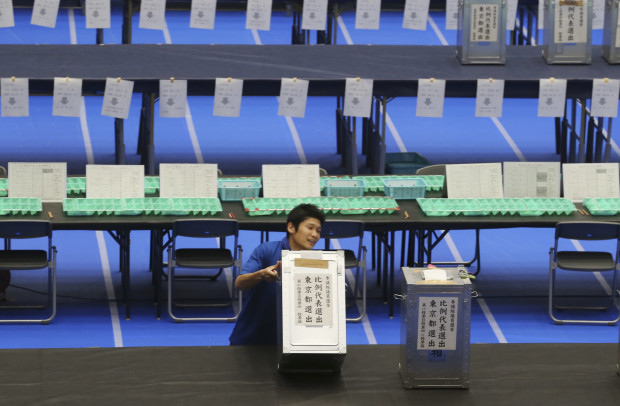Japan coalition scores bigger-than-expected election win

An election staff member carries a ballot box for voting at a ballot counting center in Tokyo, Sunday, July 10, 2016. Japan’s ruling coalition was a clear winner in Sunday’s parliamentary election, Japanese media exit polls indicated. The vote paves the way for Prime Minister Shinzo Abe to push ahead with his economic revival policies, but also possibly changing the nation’s postwar pacifist constitution. AP
TOKYO, Japan — Japan’s ruling coalition scored a stronger-than-expected victory in parliamentary elections, results showed Monday, as voters chose stability and hopes for economic revival over opposition pleas to stop the prime minister from building a more assertive military.
Half of the seats of the less powerful upper house, or 121 seats, were up for grabs in Sunday’s vote. There had been no possibility for a change of power because the ruling coalition, headed by Prime Minister Shinzo Abe’s Liberal Democratic Party, already controls the more powerful lower house, but the balloting was a key gauge of how much support Abe’s coalition has among the public.
The Liberal Democrats won 56 of the 121 seats, official results showed on Monday. The party’s coalition partner Komeito won 14 seats. The total of 70 seats was far better than the goal of a combined 61 seats set by Abe.
That number may grow if independent candidates join the coalition, common in Japanese elections, and if there are defections from the soundly defeated opposition, less common but what analysts are predicting might happen.
Abe appeared before TV cameras at party headquarters late Sunday to pin red flowers, indicating confirmed wins, next to his candidates’ names written on a big board.
“I am honestly so relieved,” he told NHK, promising new government spending to help wrest the economy out of the doldrums in a “total and aggressive” way. He declined to give details.
With their pro-business policies, the Liberal Democrats have ruled Japan almost continuously since World War II, and until recently enjoyed solid support from rural areas. The few years the opposition held power coincided with the 2011 earthquake, tsunami and nuclear disasters that devastated northeastern Japan. The opposition fell out of favor after being heavily criticized for its feeble reconstruction efforts.
Robert Dujarric, professor and director of the Institute of Contemporary Asian Studies at Temple University Japan in Tokyo, said the win reflected voters’ disenchantment with the opposition, rather than their excitement about Abe’s policies.
“The public is old. It doesn’t want change,” he said. “It doesn’t want what Japan really needs — more structural reform, less money for the old, and more funding for families and children.”
Combined with other conservative politicians, the coalition has a two-thirds majority in the upper house, which is needed to propose any referendum to change the constitution, written by the U.S. after Japan’s defeat in World War II. The constitution has a clause that limits Japan’s well-equipped army, navy and air force to self-defense.
Many members of Japan’s military don’t anticipate becoming involved in overseas wars, expecting their work to be limited to disaster relief. But some Japanese increasingly agree with Abe’s views on security because of growing fears about terrorism, the recent missile launches by North Korea and China’s military assertiveness.
Tetsuro Kato, professor of politics at Waseda University, said Abe won’t rush to change the constitution, saying he needs better timing because the recent strengthening of the yen — a minus for exports — and concerns about global economic growth.
Yukio Edano, the legislator who ran the campaign for the main opposition Democratic Party, acknowledged that while the public agreed with his party’s message that Abenomics wasn’t working for regular people, he told NHK that the “… people felt we did not offer enough of an alternative.”
Abe during the campaign that his “Abenomics” program, centered on easy lending and a cheap yen to encourage exports, was still ongoing and that patience was needed for results. He downplayed the constitutional question during the campaign, saying only that discussion was needed.














